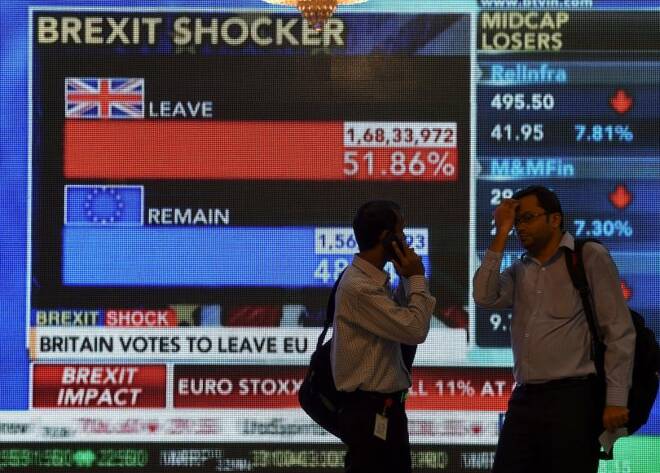Advertisement
Advertisement
Brexit, the Pound and the Political Chaos
By:
Time is rapidly running out for the British Government to garner a deal. As the UK political parties divide, it's looking gloomy for the Pound.
The Pound
The road to Brexit has been a treacherous one for those with exposure to the Pound. Following an unsurprising slide in the Pound in response to the EU Referendum back in 2016, we’ve seen the flash crash to a low $1.19048, a bounce back to a post-EU Referendum high $1.43767 and then the downward spiral back to as low as $1.23 levels last month.
Driving the Pound has ultimately been sentiment towards Brexit and whether the British government will be able to negotiate a favorable Brexit deal ahead of the scheduled March departure from the EU.
In spite of the EU Referendum vote having taken place back in June 2016, uncertainty over what lies ahead continues to plague the Pound, not to mention British politics.
Year-to-date, the Pound was down by 4.36% to Monday’s closing $1.2924. While the Pound has taken quite a hammering since the EU Referendum, down by 13.95%, in stark contrast had been the performance of the FTSE100, until this year at least.
A negative correlation between the Pound and the FTSE100 saw multinationals soar as the Pound slid to levels not seen in most people’s trading careers. The correlation between the two has certainly increased over the course of this year, with the FTSE100 down 6.09% year-to-date.
Economic indicators, domestic politics, and uncertainty over how the economy will fare in the post Brexit era have ultimately done the damage.
The Economic Indicators
Figures released last week showed that the UK economy grew by just 0.2% in the 4th quarter of last year, quarter-on-quarter. Adding to the downside to the Pound was softer than expected inflation figures for January, the combination of which supports the BoE’s status quo on the policy front.
January retail sales did impress, with a 1.2% jump in core retail sales suggesting that Brexit is more of a political drama than a consumer one.
The reality is, however, that January’s bounce back in retail sales may well be a temporary one. Labor market conditions have remained resilient to the uncertainties, but whether the resilience is sustainable remains to be seen. A no-deal departure could see the annual rate of inflation return to double digits and, with Britain being a net importer of goods it doesn’t bode well.
UK industrial and manufacturing production has been on the slide and the UK’s service sector had seen activity almost stagnate at the start of the year.
All of this comes ahead of Britain’s actual departure from the EU, assuming that Brexit goes ahead and the UK government and UK politics don’t implode.
The Politics
Cameron’s weepy resignation in the wake of the EU Referendum result should have been a warning for Parliament and the country. While some may have been surprised by the division across the nation over whether to remain or leave, the division across the ruling and opposition parties over Brexit has been more astonishing than surprising.
Theresa May took the unenviable task of leading Britain out of the EU. With the task already a difficult one, she has faced a snap general election that led to a coalition government and a vote of no confidence and that’s before considering the parliamentary votes on Brexit.
Fortunately for the British PM, few others, if any, have had an interest in taking over at number 10, which is perhaps the only positive for the Pound, though the political wrangling and in-party divisions will ultimately take its toll on the Pound and the economy, whether Britain gets a deal, leaves without a deal, or even stays.
As the Labour party begins to buckle under the pressure of Brexit, 7 lawmakers having resigned on Monday, one wonders how much worse things will get, with just under 40 days remaining before B-Day.
For some reason, members of parliament seem to think that Brussels has a vested interest in delivering a favorable deal to Britain. Granted, Britain’s economy is a substantial one and a relevant one to the likes of France and Germany, but of greater consideration remains the preservation of the EU.
The Establishment has fought tooth and nail to avoid member states from falling out of the EU and, while support for populist parties has been on the rise, talk of leaving the EUR or the EU have been few and far between.
It remains unclear why anyone in Britain believes that Theresa May will be able to pull a rabbit out of the hat. Tusks comments last month on Brexit will still be resonating in Parliament or should be. The question is whether the British PM has a Plan C that would be deemed as acceptable by both the EU and Parliament or is Britain really heading for that ‘Special place in Hell’?
For the UK, a divided parliament is failing to deliver the people’s vote and as the country’s two main political parties divide into pro- and anti-Brexiteers, the political outlook for the UK could become as significant to the UK economy and the Pound as Brexit itself.
Can the Pound really hold on amidst such uncertainty? The outlook towards the global economy has shifted, with downside risks on the rise. The timing of Britain’s departure from the EU couldn’t have come at a worse time.
Could we see the Pound return to its all-time low $1.05 struck back in February 1985? A no deal and it would be hard to see any other outcome…
About the Author
Bob Masonauthor
With over 28 years of experience in the financial industry, Bob has worked with various global rating agencies and multinational banks. Currently he is covering currencies, commodities, alternative asset classes and global equities, focusing mostly on European and Asian markets.
Advertisement
